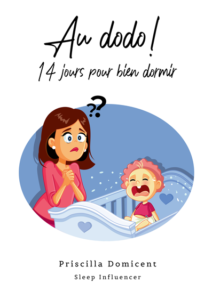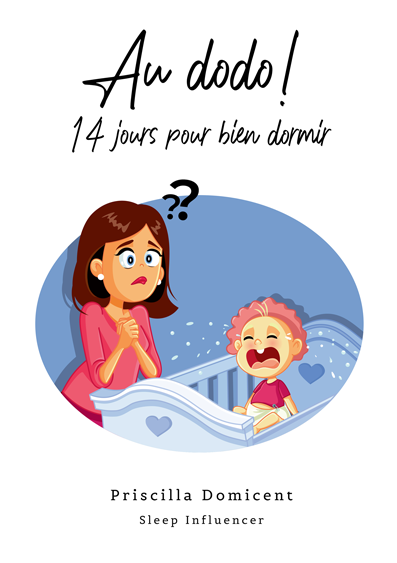Key takeaways
- Sleep directly impacts a baby’s health, mental, and physical development. Children grow and develop better with adequate sleep.
- Make sleep a top priority as from the beginning and you will likely have a happier, self-assured, less demanding, and more sociable child.
- Benefiting from enough qualitative sleep is essential for the whole family. Well-rested babies allow for well-rested parents and for a happier marriage. So, sleep should be your family’s priority.
Sleep plays a crucial role in good health and well-being throughout our life, in the same way as oxygen, water, and food. Did you know that we can live longer without food than without sleep? Good nutrition is crucial for your baby’s body development as is sleep for brain development. But a sleeping brain is not a resting brain. It is somehow functioning differently than in a wakeful state.
What type of sleep are we talking about?
Babies do not only require a proper amount of sleep to grow to their full potential. They also need enough of the right kind of sleep. They have to benefit from sound, deep and, more restorative sleep. That is so important to their developing brains.
The prolonged lack of enough quality sleep can have real repercussions on the mood, the safety as well as the mental and physical health of all family members. A child’s sleep deprivation can affect his parents’ relationship and life balance. Good sleep hygiene is essential in our life and, especially, in our children’s life.
So, if you were worried that wanting more sleep makes you selfish, think again. Terry Cralle, a registered nurse, confirms that “it’s important to make sleep a family priority. Ensuring proper sleep in childhood offers a lifetime of benefits.”
Why should parents focus on their baby’s sleep?
Science tells us that if we get the appropriate number of hours of sleep, it helps the learning process, increases our ability to concentrate, aids metabolism and weight control, reduces irritability and impatience, decreases the risk of suffering from depression, and strengthens our immune system.
Similarly, healthy sleeping habits are essential to promote children’s cognitive, behavioral, emotional, and physical development. By providing your child’s brain sufficient sleep, she will learn better by maximizing her concentration capacity, will be less likely to go through mood swings, happier, healthier, and successful. From an early age, you can help your child develop a good foundation for peaceful nights. Healthy sleep hygiene starts early in life (Read: What is healthy sleep hygiene?).
Here are a few reasons, among others, that explain why sleep is essential for little ones:
- Researchers have found that sleep and the circadian system are strong regulators of immunological processes. Insufficient sleep weakens the immune system’s ability to fight off short-term, chronic, and acute health problems.
- Babies need sleep to physically grow. It is during the night that growth-related hormone is produced.
- The human brain is developing until around the age of 21. Thanks to sufficient sleep until then, a child will help reach her full potential. Sleep boosts her attention and concentration, helping her learn new skills. According to the medical journal Sleep “short sleep duration in the first three years of life is associated with hyperactivity/impulsivity and lower cognitive performance on neurodevelopmental tests at age 6.” The lack of sleep can put children’s health at risk. Their brains are in an early development phase and they are constantly recording new information. Childhood is a period of linguistic, motor, and cognitive learning. The brain’s plasticity gives them the ability to accumulate so much knowledge in so little time. Thanks to the REM phase, the experiences are encoded in their memory. With a lack of this deep sleep, memories can be lost forever. So, learning and sleep are inseparable.
- Sleep is prime time for the brain to process, transform, and store learned material. Dreams allow babies to process daytime emotional experiences and memorize events.
- According to Patrick McNamara, Ph.D., dreams (during the REM stage) help promote attachment. McNamara states that the dreams about family members facilitate emotional bonding during wake time.
- A study proved that increased sleep is correlated with an easy-tempered baby, who is more approachable and adaptable. Well-rested babies are easier to calm down, less prone to anger, frustration, and temper tantrums than sleep-deprived children. Insufficient sleep impairs emotion stabilization.
Research conducted by Dr. Miller at the University of Warwick has found that children who regularly sleep less than others of the same age gain more weight when they grow older and are overall 58% more likely to become overweight or obese. According to Dr. Miller, “the study reinforces the concept that sleep deprivation is an important risk factor for obesity, detectable very early on in life.”
Why should parents focus on their own sleep
“First thing in the morning, we’re really tired, and we look at each other and we wonder, ‘Are we ever going to get sleep? ” – Angelina Jolie
The benefits of sleep are not just seen in an infant’s development, there is also a major impact on the family unit. Long periods of interrupted nights could not only cause damages for your baby but also impact your physical and mental health.
If birth is a happy event marking the life of a couple, it causes irreversible changes, not always in a positive sense. Tiredness and the screams can precipitate you and your partner in a turbulent zone, putting your couple in danger.
The inability to disconnect is not the only reason for sleep challenges. Research conducted by the University of Berkeley with 2’000 parents focused on the impact of a child’s sleep on the parental balance. It revealed that parents sleep an average of 6 hours per night and have a hard time managing the lack of sleep.
30% of divorced or separated parents mention that the main reason that triggered their separation is the sleepless nights caused by their baby crying. Beyond an insufficient duration of sleep for the young parents, it is the duration of uninterrupted sleep which is invoked. At least 5 hours of uninterrupted sleep would be needed to properly concentrate and, among other things, prevent postpartum depression.
Of those surveyed, 11% admitted to pretending to sleep when their baby’s crying wakes them up, leaving their partner to care for the child. The same number of parents decide to close the door, to stop hearing the screams. According to psychiatrist Bernard Geberowicz, 100% of parents experience turbulence when their first baby arrives. He also states that 20 to 25% of couples break up after four or five years of cohabitation, which often coincides with the beginnings of parenthood. This is linked to the numerous symptoms of sleep deprivation, such as irritation, depression, and getting defensive more easily when running on little to no sleep.
Besides creating chaos in a couple’s daily life, sleep deprivation can have the following consequences for adults:
- Feeling less alert
- Having a shorter attention span
- Working less efficiently
- Feeling sad or even depressed
- Feeling stressed and having fears
- Having less energy to participate in social activities or to go outside the house
- Getting easily irritated and defensive
- Feeling continuously tired
- Suffer from a weaker immune system
- Increasing risk for sleep issues, unusual appetite, diabetes, (car) accidents, Alzheimer’s, and dementia.
Postpartum depression, referring to the depression some mothers deal with after giving birth, has now reached a 1/7 women rate. Celebrity moms, including Chrissy Teigen, Sarah Michelle Gellar, and Adele, have publicly described their post-partum suffering. This perinatal disease has been closely linked to sleep deprivation. More specifically, women who get less than 5 hours of sleep on a constant basis are at a higher rate of suffering from postpartum depression. This perinatal mood disorder can lead to severe marital or relationship problems.
Read: Understanding postpartum depression
Restricted sleep has also negative effects on our facial appearance and social appeal according to research carried out by the Royal Society Open Science. The results showed that study participants were less inclined to socialize with individuals who had gotten insufficient sleep. Furthermore, sleep-restricted participants were perceived as less attractive and less healthy.
According to research, sleep deprivation is also linked to higher mortality risk. An individual sleeping on average less than six hours per night has a 13% higher mortality risk than someone sleeping between seven and nine hours. An individual sleeping between six and seven hours per day still has a 7% higher mortality risk. Unfortunately, tragedies remind us how vital sleep is. In 2018, a western Pennsylvania father fell asleep with his 1-month-old son on his chest. Smothered by dad’s body, the infant had stopped breathing. In Florida, a 9-month-old baby died last year because he left alone in bath and drowned while parents sleep.
Based on research conducted about the sleeping habits of people from across the UK, it appears that parents are getting just 5.1 hours of sleep per night in the first year of their child’s life. This means that they lose a total of 44 nights during that period. The National Sleep Foundation states that “insomnia in parenthood can come from having to multitask and balance busy lives. Lying down in bed brings spinning thoughts of to-do lists and worries about family matters, both small and large”.
In addition, a study suggests that parents’ own sleep quality may bias how they perceive their child’s sleep issues. Indeed, a Finnish study looked at 100 children ages 2 to 6. Their parents filled out questionnaires about the sleep quality of their kids and also of themselves. Researches concluded that “parental sleep quality was associated with overreporting of sleep problems in their children.”
Improving your baby’s sleep has significant advantages that go beyond his development. As sleep-deprived parents, take the necessary initiatives as soon as possible to get your life back on track. This will help you to be a better parent, partner, friend, and, employee. Should you need some reassurance, support, or guidance, talk to your family doctor or pediatrician. If you would like to get more information on how to improve the quality and the quantity of your child’s sleep, schedule your first free consultation now! It is a free and non-binding offer.









